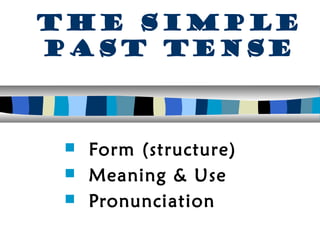
Past simple
- 1. The Simple Past Tense Form (structure) Meaning & Use Pronunciation
- 2. How do we form the simple past tense . . .? English has two types of verbs in the past taught tense: walked Regular verbs studied Irregular verbs gave Look at the became following list of cried past tense verbs… lived which verbs are did regular, and which are irregular?
- 3. Regular verbs are verbs that …. …end with – ed Simple Form Past Tense walk study cry live
- 4. Irregular verbs are verbs that . . . . …DON’T end with – ed some irregular verbs Have a vowel change in the past tense: Simple Form Past Tense become became give gave drive dr ove forget forgot
- 5. other irregular verbs Have a different kind of change: Simple Past teach taught bring brought leave left hear heard buy bought
- 6. And some irregular verbs don’t change at all . . . Simple Past hit hit put put set set The children set the table every Sunday. The children set the table last night.
- 7. For regular verbs, simply use the –ed form of the verb in a positive sentence. When I was a child, I ___________ the piano. Donna ______________ and _______________ in Paris when she was younger.
- 8. For irregular verbs, use the correct past tense form in positive sentences. sent you a letter. Last week, I She bought an expensive hat.
- 9. For negative sentences,USE I went to work yesterday. Carl didn’t go to work because he was sick.
- 10. For interrogative sentences, USE Did he drive to work yesterday?
- 11. Exception = THE VERB TO BE! Never use DID NOT or DIDN’T with the verb BE. Instead, just use:
- 12. The verb “To Be”-affirmative form I was You were He/she/it was We were You were They were
- 13. The verb “To Be”-interrogative form Was I? Were you? Was he/she/it? Were we? Were you? Were they?
- 14. The verb “To Be”-negative form I was not/ I wasn’t You were not/you weren’t He/she/it was not-He/she/it wasn’t We were not/we weren’t You were not/you weren’t They were not/they weren’t
- 15. TIME MARKERS In what situations do English speakers use the Simple Past Tense? For completed actions in the past. What are some common time expressions used with the past tense?
- 16. Examples: I saw Maria yesterday. yesterday Last Friday, the students finished their Friday History project. They got married two years ago. ago
- 17. pronunciation The –ed ending in English has:
- 18. Some regular verbs end with a “ t ” sound: Walked Laughed Washed Talked jumped
- 19. Some regular verbs end with a “ d ” sound: planned played learned answered loved
- 20. Other regular verbs end with an “ id” sound: id Simple Form Past Tense
